#it effects half the worlds population
Text
Trying not to think about my upcoming hysterectomy surgery so I made some memes...
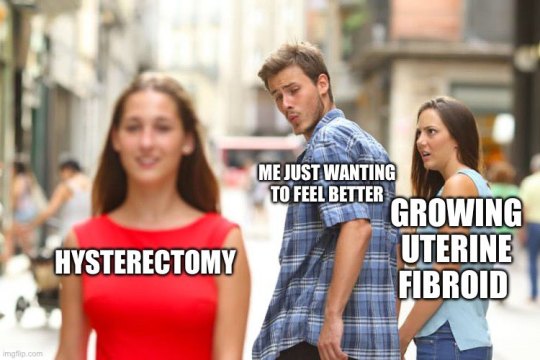


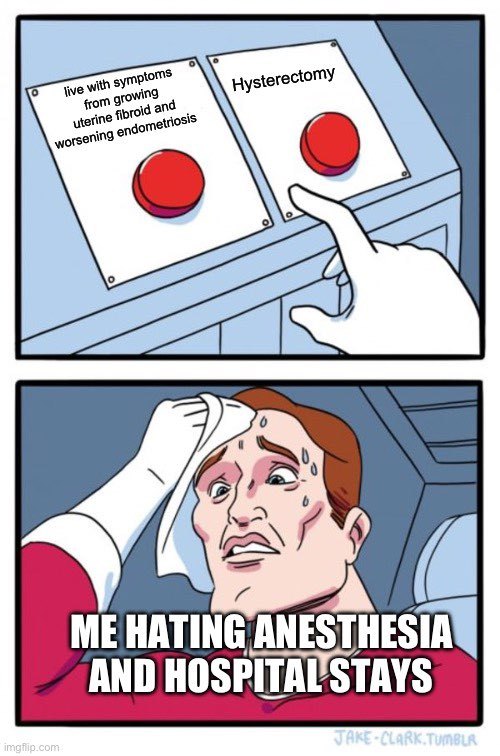
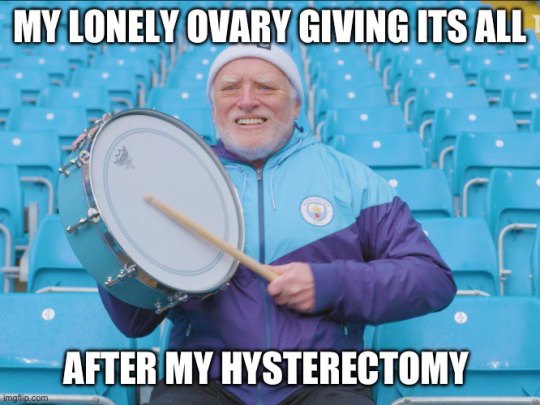

#hysterectomy#uterine fibroids#endometriosis#fuck uterine fibroids#fuck endometriosis#can't wait to feel better#due to previous endometrioma surgery I only have 1 ovary left#little guy is such a trouper#my memes#the skeletor one is my favorite#fuck off uterus#i've had enough of your shit#surgery anxiety#memes are how I cope#normalize menstrual talks#it effects half the worlds population#some of us who menstruate are cursed with endless problems#find a dr who will listen#advocate for yourself#my first dr said I was just constipated#turned out I had a giant ovarian cyst#shout out to dr h she's an angel#perimenopause#shit goes down hill at 40 don't it#my body hates hormonal birth control so I'll still probably deal with endometriosis pain#it wasn't helping when I was on it anyway#now i'm just rambling
10 notes
·
View notes
Text
SFX Magazine Issue 372 - Designing Good Omens ❤ 😊

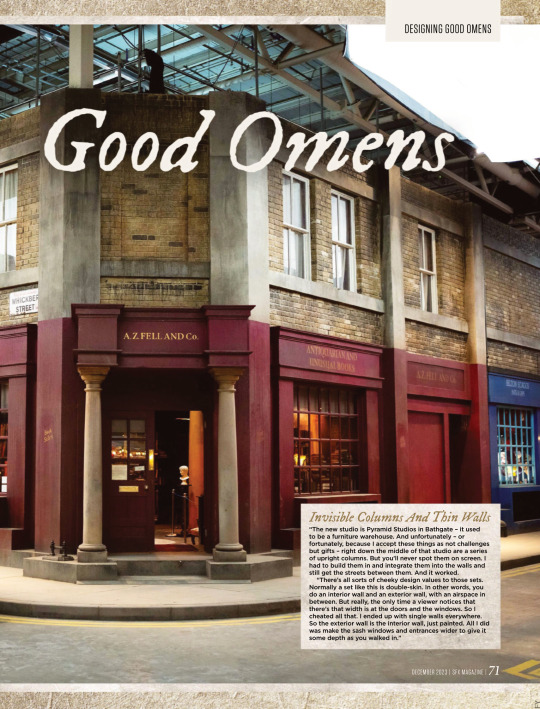




PRODUCTION DESIGNER MICHAEL RALPH REVEALS HOW THE SHOW’S CENTREPIECE SET, WHICKBER STREET, WAS GIVEN A DEVILISHLY CLEVER UPGRADE FOR THE SECOND SEASON
WORDS: DAVE GOLDER

Invisible Columns And Thin Walls “The new studio is Pyramid Studios in Bathgate – it used to be a furniture warehouse. And unfortunately – or fortunately, because I accept these things as not challenges but gifts – right down the middle of that studio are a series of upright columns. But you’ll never spot them on screen. I had to build them in and integrate them into the walls and still get the streets between them. And it worked.
“There’s all sorts of cheeky design values to those sets. Normally a set like this is double-skin. In other words, you do an interior wall and an exterior wall, with an airspace in between. But really, the only time a viewer notices that there’s that width is at the doors and the windows. So I cheated all that. I ended up with single walls everywhere. So the exterior wall is the interior wall, just painted. All I did was make the sash windows and entrances wider to give it some depth as you walked in.”


GOOD OMENS HAD A CHANGE of location for its second season, but hopefully you didn’t notice. Because Whickber Street in Soho upped sticks from an airfield in Hertfordshire to a furniture warehouse in Bathgate, Edinburgh. It’s the kind of nonsensical geographical shenanigans that could only make sense in the crazy world of film and TV, and production designer Michael Ralph was the man in charge of rebuilding and expanding the show’s vast central set. “I wish we could have built more in season one than we did,” says Ralph, whose previous work has included Primeval and Dickensian. “We built the ground floor of everything and the facades of all the shops. But we didn’t build anything higher than that, because we were out on an airfield in a very, very difficult terrain and weather conditions, so we really couldn’t go much higher. Visual effects created the upper levels.”
But with season two the set has gone to a whole other level… literally. “What happened was that the rest of the street became integrated into the series’s storyline,” explains Ralph. “So we needed a record shop, we needed a coffee shop that actually had an inside, we needed a magic shop, we needed the pub. To introduce those meant we had to
change the street with a layout that works from a storylines point of view. In other words, things like someone standing at the counter in the record shop had to be able to eyeball somebody standing at the counter in the coffee shop. They had to be able to eyeball Aziraphale
sitting in his office in the window of the bookshop. But the rest of it was a pleasure to do inside, because we could expand it and I could go up two storeys.”
For most of the set, which is around 80 metres long and 60 metres wide, the two storeys only applied to the shop frontages, but in the case of Aziraphale’s bookshop, it allowed Ralph to build the mezzanine level for real this time. According to Ralph it became one of the cast and crews’ favourite places to hang out during down time.
But while AZ Fell & Co has grown in height, it actually has a slightly smaller footprint because of the logistics of adapting it to the new studio.
“Everybody swore to me that no one would notice,” says Ralph wryly. “I walked onto it and instinctively knew there was a difference
immediately, and they hated me for that. I have this innate sense about spatial awareness and an eye like a spirit level.
“It’s not a lot, though – I think we’ve lost maybe two and a half feet on the front wall internally. I think that there’s a couple of other smaller areas, but only I’d notice. So I can be really annoying to my guys, but only on those levels. Not on any other. They actually quite like me…”

Populating The Bookshop “The props in the new bookshop set were a flawless reproduction from the set decorator Bronwyn Franklin [who is also Ralph’s wife]. It was really the worst-case scenario after season one. She works off the concept art that I produce, but what she does is she adds so much more to the character of the set. She doesn’t buy anything she doesn’t love, or doesn’t fit the character.
“But the things she put a lot of work into finding for season one, they were pretty much one-offs. When we burnt the set down in the sixth episode, we lost a lot of props, many of which had been spotted and appreciated by the fans. So Bronwyn had to discover a new set decorating technique: forensic buying.
“She found it all – duplicates and replicas. It took ages. In that respect, the Covid delay was very helpful for Bron. There’s 7,000 books in there and there’s not one fake book. That’s mainly because… it’s a weird thing to say, but we wanted it to smell and feel like a bookshop
to everybody that was in it, all the time.
“It affects everybody subliminally; it affects everybody’s performance – actors and crew – it raises the bar 15 to 20%. And the detail, you know… We love a lot of detail.”
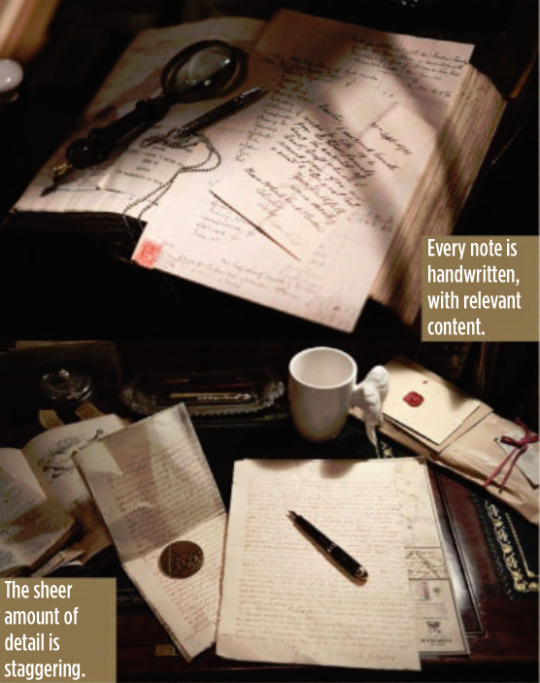

(look at the description under this, they called him 'Azi' hehehehe :D <3)


Aziraphale’s Inspirational Correspondence “There’s not one single scrap of paper on Aziraphale’s desk that isn’t written specifically for Aziraphale. Every single piece is not just fodder that’s been shoved
there, it has a purpose; it’s a letter of thanks, or an enquiry about a
book or something.
“Michael Sheen is so submerged in his character he would get lost
sitting at his own desk, reading his own correspondence between
takes. I believe wholeheartedly that if you put that much care into every single piece of detail, on that desk and in that room, that
everybody feels it, including the crew, and then they give that set
the same respect it deserves.
“They also lift their game because they believe that they’re doing something of so much care and value. Really, it’s a domino effect of passion and care for what you’re producing.”
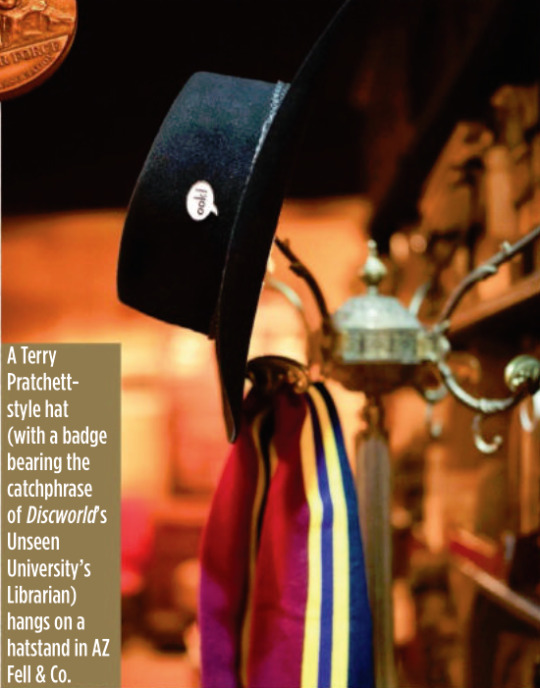


Alternative Music “My daughter Mickey is lead graphic designer [two of Ralph’s sons worked on the series too, one as a concept artist, the other in props]. They’re the ones that produced all of that handwritten work on the desk. She’s the one that took on the record shop and made up 80 band names so that we didn’t have to get copyright clearance from real bands. Then she produced records and sleeves that spanned 50, 60 years of their recordings, and all of the graphics
on the walls.
“I remember Michael and Neil [Gaiman] getting lost following one band’s history on the wall, looking at their posters and albums desperately trying to find out whether they survived that emo period.”

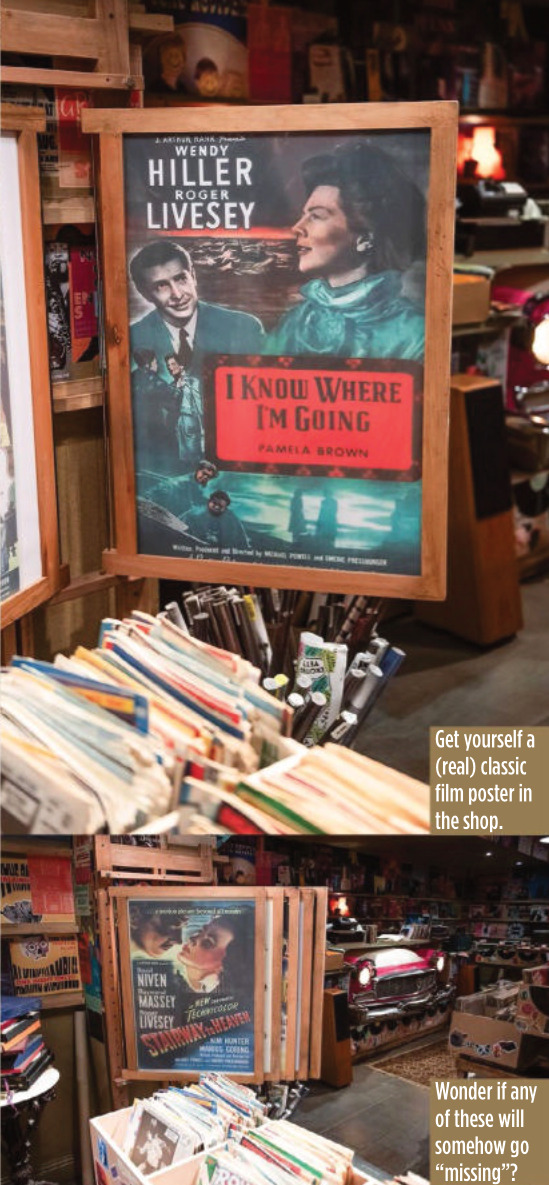



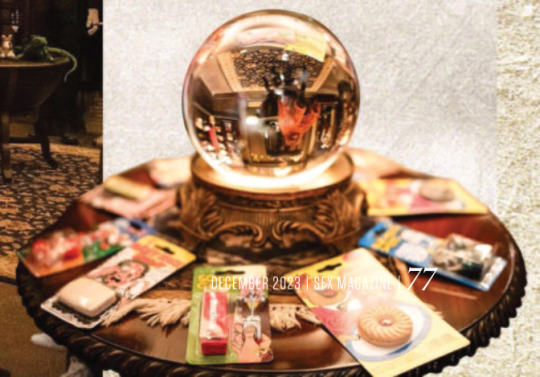
It’s A Kind Of Magic One of the new shops in Whickber Street for season two was Will Goldstone’s Magic Shop, which is full of as many Easter eggs as off-the-shelf conjuring tricks, including a Matt Smith Doctor Who-style fez and a toy orang-utan that’s a nod to Discworld’s
The Librarian. Ralph says that while the series is full of references to Gaiman, Pratchett and Doctor Who, Michael Sheen never complained about a lack of Masters Of Sex in-jokes. “He’d be the last person to make that sort of comment!”
Ralph also reveals that the magic shop counter was another one of his
wife’s purchases, bought at a Glasgow reclamation yard.
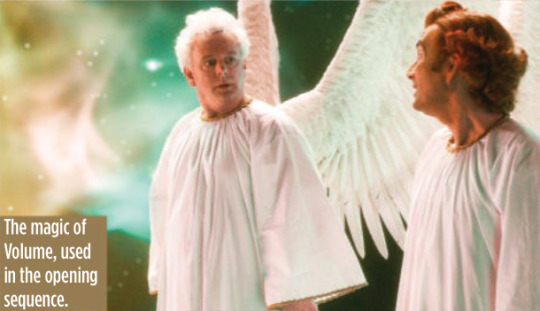
The Anansi Boys Connection Ralph reveals that Good Omens season two used the state-of-the-art special effects tech Volume (famous for its use in The Mandalorian to create virtual backdrops) for just one sequence, but he will be using it extensively elsewhere on another Gaiman TV series being made for Prime Video.
“We used Volume on the opening sequence to create the creation of the universe. I was designing Anansi Boys in duality with this project, which seems an outrageously suicidal thing to do. But it was fantastic and Anansi Boys was all on Volume. So I designed for Volume on
one show and not Volume on the other. The complexities and the psychology of both is different.”
#good omens#gos2#season 2#photos#bts#bts photos#interview#sfx magazine#magazines#hq photos#neil gaiman#terry pratchett#michael sheen#david tennant#michael ralph#mickey ralph#bronwyn franklin#anansi boys#the small back room#maggie's record shop#soho#aziraphale's bookshop#dirty donkey#magic shop#aziraphale's correspondence#give me coffee or give me death#fun fact#michael ralph interview#sfx 372 magazine#s2 interview
4K notes
·
View notes
Text
This was a reply to someone else, but I'm making this its own post because so many people are being so evil right now re: Noah Schnapp.
You can find other, longer explanations with history and all, but all the places I've seen more or less agree with this:
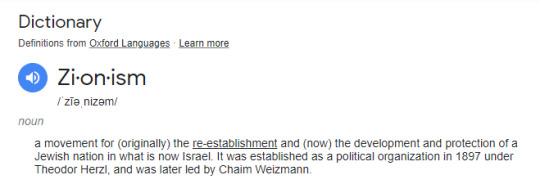
So you're all calling people to cancel Noah because he's in favor of a Jewish nation in what is today Israel. Which is a perfectly reasonable, decent and educated opinion to have, especially when you, to use a trendy term, "educate yourself" and find out why the state of Israel was created.
11000 dead Palestinians, half of them children
According to Hamas. Don't forget that, ever. They're the current, official government of Gaza, thus they're the ones who give numbers. This means that the real number could be 10, 1 million, anything in between. What I've read is that they probably give more of less accurate total numbers. What they fail to do, however, is distinguish between Hamas militants and civilians, and beteween civilians killed by IDF strikes, civilians killed by failed Hamas or Palestininan Islamic Jihad's rockets (which happens a lot), and Palestinians murdered by Hamas/PIJ (which also happens, a whole damn lot). They also don't specify how many civilians they have prevented or tried to prevent from evacuating or receiving aid.
11k dead people is a horrible number. Even 1 dead person is a horrible number. However, urban warfare in such a densely populated area is its own kind of hell, especially when the other side is fond of using civilians as human shields in every way possible. The fact that the number is 11k and not 50k, 100k, and so on, indicates that the IDF have indeed done a lot to minimize deaths. You don't genocide people by doing roof knocks, opening evacuation lines, dropping guided bombs, putting up an Iron Dome to deal with rockets while avoiding escalation, etc. simply because actual genocide, while a lot worse, is also cheaper, easier and faster than what they're doing. This is important because caling every act of war genocide dilutes the word, and there are actual genocides happening around the world. Also, there is a difference between striking military targets and causing civilian deaths as a side effect (what the IDF is doing) and planning and carrying out a massacre deliberately targeting civilians and inflicting as much pain and humilliation as possible on them. And there is a difference between doing so by breaking a ceasefire (which is what Hamas did), and defending your country because if you don't do that a terrorist group will anhilate you (which is what the IDF is doing).
Back to Noah. So far, these are the things that people have tried to cancel him for:
Traveling to Israel (a completely normal thing)
Having Israeli friends (another completely normal thing)
Condemning Hamas' horrible attack on October 7th (the decent thing to do)
Posting a statement saying he feels unsafe as a Jewish person in the US (which, given the rise of antisemitic acts in the world, including the US, including where he lives and where he studies, is a valid feeling to have)
Signing a letter, along with Shawn Levy, Brett Gelman, Ross Duffer and I think Cara Buono, asking Biden to press for the liberation of every hostage by Hamas. This especially shows the utter ignorance of the cancellers because, as it turns out, caring about every hostage implies a slowdown of IDF's actions (and, at the time, a delay of a ground invasion).
Supporting the existence and preservation of the state of Israel (once again, a completely normal thing). The fact that people are turning against him for these things says to me that the real reason you are all hating Noah is beacuse:
He's Jewish. Like, really really Jewish.
And the fact that this all comes from a place of antisemitism isn't hidden at all: I've seen y'all on here, on Twitter, Reddit, every other social media calling him slurs (such as "cunt"), censoring his name, pretending he's not part of the cast, asking the Duffers/Netflix to fire him, wishing him failure, doxxing him, calling on his classmates to physically assault him, etc. He doesn't need to educate himself: you guys are already teaching him a great lesson on why a Jewish state is necessary. If that's the treament he gets from his own "fans", what can he expect from the world at large?
#byler#noah schnapp#antisemitism#jumblr#stranger things#i know many people here are actual children or college students#who have never lived war or armed conflict#and this is baby's first social justice fight#but the way you're acting towards Noah is disgusting and evil#I'm not even jewish but I know what terrorism is like#and I know what it's like to have idiot 1st worlders be on the terrorists' side because they think they're “liberators” or something#harming the very people you think they help
882 notes
·
View notes
Text
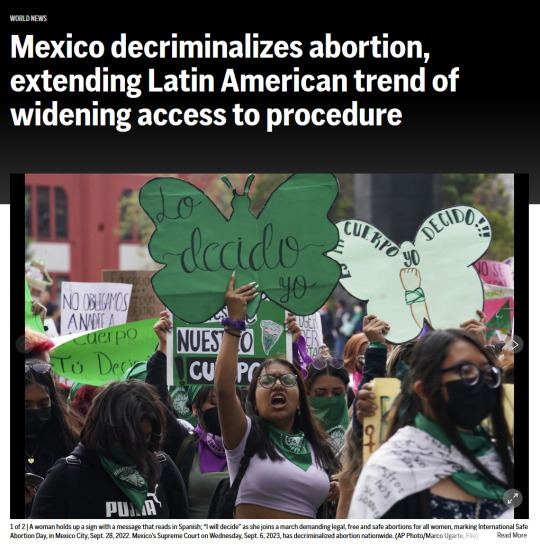
the supreme court of Mexico has made a historic decision by ruling that federal criminal penalties for abortion are unconstitutional. in addition to being a victory for women's rights in Mexico, this ruling also reflects the growing trend in latin america to recognize and uphold reproductive rights.
the court's ruling requires that abortion must be taken out of the federal penal code. as a result, any pregnant woman or individual can now get an abortion without worrying about facing legal ramifications. all government healthcare organizations, including the public health service, are now required to offer abortion services to anyone who requests them.
the journey is still far from over, though. even if the federal law has changed, roughly 20 states in Mexico still forbid abortion. there will be more court cases in these states.
social media lit up with joyous posts. the choice was praised as a "big step" in the direction of gender equality by Mexico's national agency for women. however, there were dissenting opinions, and like the united states, many of them came down to fundamentalist, reductive religious beliefs. some people vowed to continue fighting against increased access to abortion because of these beliefs and they will no doubt be joined by many others in these efforts.
regardless, this choice is the result of years of campaigning and activism. a northern state's abortion laws (Coahuila) were upheld by the court two years ago. this launched a campaign towards decriminalization on a state-by-state basis. Aguascalientes just became the 12th state to decriminalize abortion last week.
what does this mean, though, for a typical Mexican woman? while the decision does not ensure that every woman will have rapid access to abortion care, it does require federal agencies to provide it, according to Fernanda daz de León, a legal expert for a women's rights organization. this could have a cascading effect that makes it more difficult for medical professionals to refuse abortions in jurisdictions where they are no longer against the law.
however, problems still exist. women still encounter opposition and legal obstacles, even in states where abortion is allowed. although the battle for reproductive freedom continues, this decision marks a critical turning point.
the "green wave" of abortion rights is spreading over latin america. countries like Argentina and Colombia have legalized abortion as a result of this movement, which is signified by green bandanas. this stands in stark contrast to the expanding abortion restrictions in some areas of the united states, where conservative state legislatures have launched an assault against a woman's right to choose. six months post-roe, 24 us states have banned abortion or are likely to do so
in spite of this, a reminder of the larger struggle for women's rights and physical autonomy is provided by the situation in Mexico. recognizing the inherent rights of half~ the world's population is more important than focusing on just one nation or one set of laws.
keep in mind that change is difficult as we fight for these rights. it calls for perseverance, fortitude, and community. Mexico's decision offers a ray of light, but there is still a long way to go until every woman has the freedom to make her own decisions.
more than anything, the abortion verdict in Mexico serves as a reminder of the practical effects of activism and campaigning. in order to achieve a society that promotes and respects the rights of all people, we must keep fighting against oppressive and restrictive regimes that would deny any individual the autonomous right to determine what occurs with their own body.
877 notes
·
View notes
Text
Splatoon 3 is wild because imagine if you were living in Japan due to a recent economic and cultural boom, and suddenly a space shuttle with a mutant house-sized T-rex riding it suddenly burst from the center of Mt. Fuji and disappeared into space without explanation, and all you ever find out about what the fuck that was about is that Zuckerburg mysteriously disappeared the same day and was never seen again, but still "officially" ran Meta through an open secret Queen-Elizabeth-being-in-good-health gaslighting campaign, and everybody kind of suspected he may have been connected but never figured out anything conclusive.
Also the T-rex is now orbiting the earth in the fetal position like the guy from Jojo, and there are rumors of a substance that, if touched, turns you into a half-dinosaur monster. Nobody understands any of this but Meta employees just keep going to work and pretending Zuck still exists. The same 12 prerecorded voicelines constantly squak from the PA system.
Oddly, the statue in front of Meta HQ of a T-rex eating a human changes overnight into one of a giant human eating a tiny T-rex. Nobody noticed the switch, despite the statue being in a constantly bustling area. It happened shortly after the shuttle incident.
Jack Black's tiny clone, Lil' Jack, now wears a headset at all times and has been acting really shady since the incident. Also they're both hyperintelligent, immortal velociraptors found in an ancient cryogenic chamber who spend their days judging college football and eating the legally harvested flesh of hillbillies. Lil' Jack is probably plotting to kill Big Jack, but Big Jack doesn't seem to care, growing fat and lazy, sleeping on public benches in a bed of throw pillows. Also, he's very open about the fact that, as a velociraptor, humans look delicious, but he hasn't actually eaten anybody aside from the aforementioned hillbillies because he's civil.
Everyone is just expected to move on with their lives after this. This is normal to you.
The local art school was recently attacked by giant sea serpents, which were actually hideously bioengineered hillbillies, fulfilling a biblical doomsday prophecy, and they were driven back by Meta's army of minimum wage, part time child soldiers armed with warcrimey jury-rigged weaponry. The sea serpents had giant frying pans grafted into their mouths, which launched primitive tactical nukes made by filling garbage bags with their explosive blood. They still exist, and occasionally defend their comrades, but spend most of their time in the deep sea.
The local homeless emo twink everyone's attracted to is a closet millionaire who sells bootleg clothing in exchange for live rats, which he messily devours behind closed doors. He's also 8 feet tall and British and only has one eye.
North Korean refugees now flood the western world, after a greasy 14 year old hipster, under the guidance of Ariana Grande and Taylor Swift, beat Kim Jong Un in a mech battle, and the EDM remix of the Japanese national anthem they performed caused like half the soldiers to immediately realize North Korea sucks ass and defect. One of these individuals, 7 foot tall hypergenius, becomes a newscaster alongside a nepo baby rapper with dwarfism who likes to eat entire jars of mayo, and also they're a popular band. Also also, they may or may not be gay. Almost the entire population is gay, so this isn't a huge deal.
The new local newscasters are a famous Japanese lion tamer, an Indian girl with a bloodline trait allowing her to control snakes, and a Brazillian man the size of a smart car who exclusively communicates via grunts.
Gods, souls and zombies are objectively real, and you're effectively immortal because real-life respawning was invented a while ago. It works like a Keurig, but with mucus instead of coffee. Submersion in water kills you.
A good deal of the population is a hivemind. They pretend to be individuals for no reason.
Almost all men are now femboys.
Despite all this, you still have to go to work at 9 tomorrow.
#splatoon 3#splatoon#splatoon fandom#splatpost#splatposting#splatoon lore#mr. grizz#new agent 3#neo agent 3#return of the mammalians
411 notes
·
View notes
Text
Daily update post:
Big news! The US, and right after it, Canada, Australia and Italy, as well as the UK and Finland, have ALL frozen their financial support of UNRWA, following evidence presented to them that some of the UN agency's employees participated in the Hamas massacre.
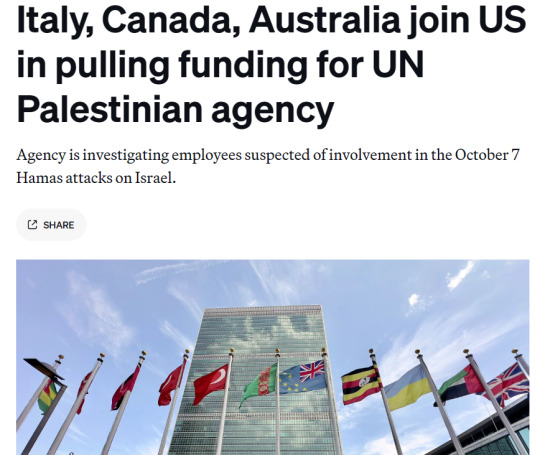
To add to the news, this is NOT the first scandal involving this agency. UNRWA facilities have been continuously used for terrorist activity, UNRWA teachers and employees have been repeatedly called out for their support of antisemitism and terrorism, the same goes for UNRWA textbooks and schools, where antisemitism and terrorism are encouraged. It's even been asked why UNRWA still exists. Palestinians are the only ones who get their own refugee agency. Every other refugee, from every other country in the world, including ones suffering far greater humanitarian disasters, are treated by the general UN refugees agency, UNHCR. And unlike UNHCR, UNRWA does not look to solve the plight of the refugees it claims to help. If it's not enough that it's unclear why should Palestinians get their own agency, and why does it perpetuate the problem of Paletsinian refugees rather than help solve it, or why is there a separate definition for Palestinian refugees than for all other ones, Palestinian refugees also get more funding (through UNRWA) than any other refugee in the world. Just to highlight the absurdity, celeb millionaires Bella and Gigi Hadid, and their millionaire father Mohamed, are all still considered Palestinian refugees according to UNRWA's definition, despite obviously being well integrated into other countries.
Something I wanna add is about proportions within the UN and UNRWA employment. Globally, the UN says it directly employees 37,000 people. UNRWA's website says over 30,000 people work for it, and most are Palestinians, "with a small number of internation staff." That means UNRWA seems internation and impartial thanks to being counted as a UN body, but in reality, it is a Palestinian orgnization. It could never be impartial, like it wants to appear. But then it gets quoted endlessly by other UN bodies, as if UNRWA's data is impartial and reliable. It's been said more than once that many Hamas members are also employed by UNRWA, and in fact, Hamas has already voiced its displeasure over the funding to UNRAW being stopped. If Hamas is unhappy about it, when Hamas has been killing its own population, that says Hamas has its own vested interest in this organization.
Funding for UNRWA has been frozen before, but then restored. So that's not a solution. This time, the UN should be pressured to dismantle UNRWA, and move Palestinian refugees to the same definition, the same budget and the same kind of care and solution granted to all other refugees under the UNHCR.
Just a reminder that thanks to the anti-Israel demonization, Jews are not safe anywhere. In London, three people were recently attacked for simply speaking Hebrew. So here's your reminder that Hebrew is the native language of Jews, there are many Jews who try to learn and speak it, and targeting people for just speaking Hebrew is by its very nature antisemitic.
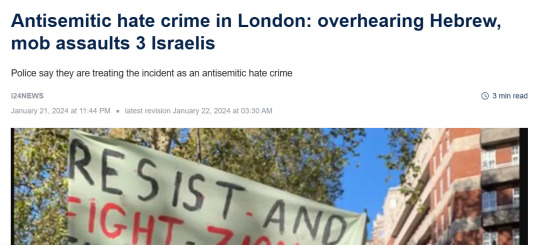
A new study shows that about half of the Israeli citizens evacuated from the north are suffering from post traumatic stress disorder. I don't know of a similar current survey regarding the Israelis evacuated from the south, but given the massacre they survived, one can only assume the situation among them is even worse.
These are Lior (right) and his 79 years old dad Chaim Perry (left).
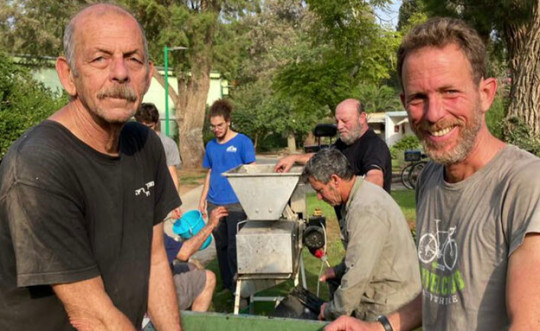
Lior's brother was murdered during the Hamas massacre on Oct 7, and his life long peace activist father Chaim was kidnapped. Lior was asked today what he thought of the International Court of Justice's call yesterday for Hamas to return all of the Israeli hostages, immediately and without any conditions. He said he also calls for the same thing, and it's about as effective.
This is Irena Maman.

She's a resident of the northern Israeli city of Kiryat Shmona, but when most of its people were evacuated, Irena refused to. With her husband's help, she's still working as a tailor, and inviting soldiers who need their uniforms fixed to come see her, offering her work to them pro bono.
These are Aviad (left) and Gideon ("Gigi," right) Rivlin.

Four Rivlin brothers went to the Nova music festival together, Aviad, Gigi, Yochai and Yinon. When the terrorist attack started, they were giving the wounded water. At a certain point, they dispersed, with each brother running in a different direction. Aviad and Gigi did not survive. In an interview, their father said he's stopped asking himself why did he lose two sons, and started being thankful for having gotten two back. Gigi was named after his uncle Gideon, who was murdered by a terrorist from Gaza.
May their memories be a blessing.
(for all of my updates and ask replies regarding Israel, click here)
#israel#antisemitism#israeli#israel news#israel under attack#israel under fire#israelunderattack#terrorism#anti terrorism#hamas#antisemitic#antisemites#jews#jew#judaism#jumblr#frumblr#jewish#resources#unrwa
245 notes
·
View notes
Text
Who is White?
If it is not I, your friendly neighbourhood non-binary deranged literature major, once again to tell you about stuff that the voices™︎ have prompted me.
This time, let's talk about the elephant in the room, the odd one out: Mr. White, a.k.a the fandom's babyboy.
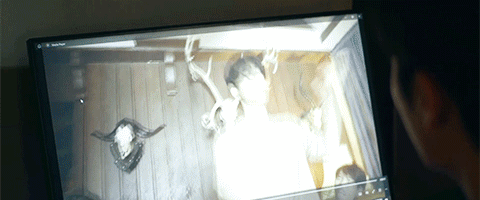
(me as Fluke in this GIF, walking in ready to dissect this bitch)
So, what do we factually know about this man?
From what we're directly told in the show:
He's Tee's boyfriend, at least, since 12th grade, meaning they have been together for about 3 years, maybe 4 (depending on when exactly we are in terms of time in the present and when exactly during 12th grade they started dating).
He's younger than the rest of them, according to Por and Top in episode 1.
He studied at a different school from the main gang AND from Phee (yes, despite the embroidery having a similar colour, the writings where the institution's name should be are nothing alike, thus, not from the same place)
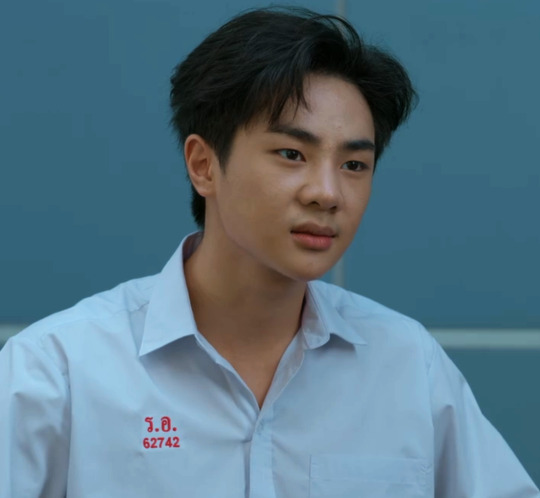
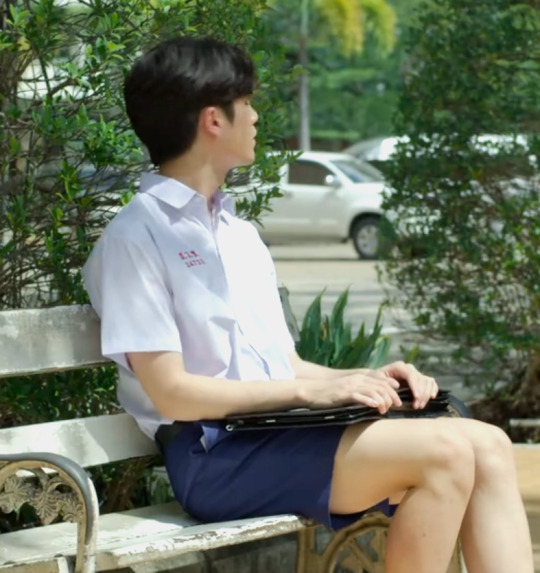
He cares a lot about his appearance (he does skincare when Por is literally dying downstairs and he sees a rash on his body while under the effect of New's absynthe - idk if it's absynthe or not but my friends and I have been calling it that since we saw them drink the green drinks so it's absynthe for me and there's that).
He's generally a very respectful person (he always speaks formally and nicely to everyone, even when people are hostile to him, like Tee or Fluke).
His fear doesn't seem to paralyze him in high-pressure situations (he strikes people with a tripod twice to save himself and others when he thinks they're in danger).
Another source could be the Yearbook, which, now, we have to be a bit more skeptical about because, as seen in New's case, it's not 100% accurate. One can argue that it is accurate because the yearbook would have Tan's info, since that's who he's living as and no one knows any better than that, including the institutions and, sure, yeah, fair. But while we don't know that White is hiding anything from us as well, we can't be sure of it. So, take the following with a grain of salt:

(translated with Google Translate)
His legal name is Watcharin Siriphan
He was born on the 25th of February 2005 (which confirms what Por and Top say)
His blood type is A (which according to the Blood Type Personality Theory means he is shy, stubborn, a perfectionist, polite and hard-working, apparently. tbh this thing is super shifty, no source seems to agree on the meaning of each type and, of course, it's a pseudoscience and all, so... yeah. take it as you will)
He's studying Software Engineering
He likes cakes
He dislikes cockroaches
He plays games and programs in his free time
So... We don't know much. He's the most generic person ever. Like... I too, and half the world's population, like cake, dislike cockroaches and like to play games. It's not exactly very special. Which is exactly why he is so intriguing. After all, we had 5 whole episodes so far, which were just the backstory of the people we see together in the mansion in the present. We've seen their personalities, their qualities and flaws, what they did and what they didn't do. We've been given a reason as to why they're here. Not just in the more direct sense of "they agreed to come here for Jin's goodbye party" but of why exactly they needed to be put all together in these conditions for this story. All except White. White is just... Barely an afterthought. We're shown when he comes into this story for the group (when he becomes Tee's boyfriend), but we're not given a reason so far as to why the narrative wants him there.
Because, sure, IRL people sometimes end up in random places and things can be pretty meaningless but this is a work of fiction. One that, evidently, has been greatly focused on details (Non's framed apple picture and Phee eating an apple alone, for example, or the correlation between the group and the colour blue). So why would it just throw us a character that is, seemingly, irrelevant to the story?
And to this, there are 2 possibilities my friends: either White is a narrative tool to get to the audience or White is not who we think he is. So let's explore it, shall we?
White = Narrative Tool
Let's start by assuming, possibly the most likely outcome, that White is exactly just a guy who ended up there due to his connection to Tee. Why would this narrative need that character?
Glad you asked. Because he's the only person who's 100% innocent. If he's just some guy who, as we've seen, keeps being respectful and nice and trying to always do the right thing, then he's got nothing to do with the others who, in different degrees are all guilty of something. He's the odd one out.
Because, yes, this is not a show of villains (at least, not in which concerns the main characters). They're all morally grey. But they have some drop of black that makes them grey.
Por is arrogant and a liar and selfish.
Tee is aggressive and manipulative and a control freak.
Top is an overall asshole and a coward.
These 3 actively bully Non. Por steals his work. Tee and Top blame him for shit he didn't do which puts in the situation where he owns Por and they spy on him. Tee manipulates him into mafia money laundry and threatens him.
Fluke is selfish and refuses to take action even when he knows it's the right thing to do.
Jin's doesn't have the capability to realize that the peaceful passive way with which he normally carries himself with won't solve the issue. Plus he's overly emotional. And a bit selfish too.
They didn't help Non when it was their moral obligation to do so. And Jin records him being abused by their teacher and possibly posts it online (though that's still up for debate).
Phee is too stubborn and also overly emotional and even overly empathic.
New is obsessive and vengeful.
Phee never really helps Non because all the ways he offers Non help are the wrong ones. He almost tries to control him. And he fails. And then he tells him awful things and breaks up with him in a terribly vulnerable moment for Non. And even when he regrets it and tries to bring justice to him, he fucks Jin because he wanted to and tries to cover it up as if it was part of the plan. Sure, they were broken up, technically, but Phee himself seems to have had "take-backies" over that breaking up. So, in his mind, at least, it's fair to say he cheats on him, which is very hypocritical after how he reacts to Non being abused. And New... He tries to help sincerely because he feels guilty but he only makes things worse. Nothing is solved and their father curses them both before committing public suicide at their mom's funeral.
Non (which may be even more relevant if he's still alive) is overly independent and uncommunicative.
He doesn't tell Jin he has a boyfriend when it's clear Jin's trying to make a move on him, event though Non's not interested. He hides very important things from Phee. He commits fraud (understandably, but yeah). And yeah, he's justified in his rage and attack but... Does he ever think of how his actions affect other such as Jin, for example, who, in his eyes, is innocent? Not really.
"Oh but White won't die!", I hear you say. "The innocent people never die in slashers!! Only the people who did the killer wrong do!" And that's exactly where I have to disagree.
So, amidst a sea of grey characters, White is, funnily enough: white. He's just good. He's done nothing wrong. And the narrative needs him because, when the others die, we'll feel (to different degrees, sure, but still, we will) that there's a reason. Even if we like the characters, those deaths will make sense. But what happens when an innocent man dies? What happens when you kill the man who wasn't even supposed to be there (he joined the trip at the last minute)?
As @syrena-del-mar says in this post: "DFF is more than just a 90s slasher film imitation". It "sits at a novel intersection of genre: horror slasher on the one hand and BL on the other hand" as @brifrischu puts it here and, for that, it bends expectations and rules and subverts what are natural tropes and events of the slasher archetype. White dying is the sort of thing this narrative, and our inventive genius Sammon, would do. Because... Do you really think they're giving us grey characters instead of black ones because we're supposed not to question this revenge? Because we're supposed to be happy about this? No. Of course not. That would be dumb. If we're meant to 100% side with the killer, then why give us likeable characters as the targets? Because, and this is as much speculation as it is reading the room, we're not.
This story, I don't know how it will end, but regardless I'm pretty confident it's supposed to tell us something important about cycles of violence: that they're neverending until someone chooses peace instead. That aggression and bloodshed and revenge... They won't bring time back, they won't undo the mistakes we make, they won't restore that which is lost, they won't make the grief go away... That they won't make us feel better. More even: that they will only hurt more people, create more injustice and prompt more revenge. And, thus, perpetuate the cycle.
So what's White's role? Being the final drop into our collective cup of realization (and perhaps the characters' as well) that this revenge mission is pointless and won't solve anything. White's role is to die.
"Oh, but uncle Dang was also innocent! Is his death not enough??", I hear you ask. And well... Maybe, maybe not. I think, honestly, his death is too impersonal for us to feel too deeply about it. Like, sure, yes, it is the death of an innocent, but it's a distant innocent. It doesn't make our blood boil because we don't know shit about that man. But, for all we don't know of White's past, we've seen him cry, we've seen him scared, we've seen him fight for his life, we've seen him be a good boyfriend and a good friend. He might just be some dude but we like him. He's the fandom's babyboy, as I said. It is more impactful and it tells the story better.
But this is just a hypothesis. And it might not convince you. And that's fair. So, because I'm a persistent obnoxious fucker with a little too much free time, I'm bringing you a second theory. For this one, though... You might need a little tinfoil hat... Be prepared.
White ≠ Who He Says He Is
So, if you think just having a character be hollow and pure good in a show of very fleshed-out and grey characters is weird, even if he might be narratively relevant, then we can only assume there's something important to White's character we don't know about yet. (I'm adding this in retrospective because I forgot but this idea came to me partially from @yellingaboutkp and their great analysis of horns in the show that you can find here)
But what could that be? We've seemingly seen all the flashbacks we needed from everyone, White doesn't seem very relevant to anyone's storyline but Tee's but... We'd assume if there was something directly connected to Tee's actions and White that we needed to see, we would've. Admittedly, the next episode seems to be on its way to tell us what Tee knows about what happened to Non and Keng while they were captured by the mafia and he could be there but I think, honestly, that it goes deeper than that. And here's why: because there's a person who's even more of an odd one out then White: whoever Perth's character is.
Now, he would've been completely unsuspicious if it wasn't for one thing: Perth's presence in the promotion of this series. He's just... Always there, somehow? Like, his character has only really appeared last episode massaging Tee's uncle but he's constantly talking about this series. Plus, his name is very well credited. AND, the absolute cherry on top, his character appears in THIS poster:
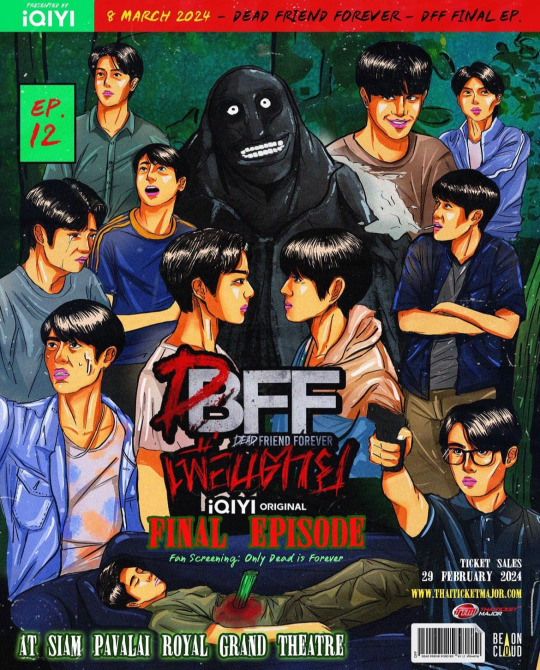
Now, yeah, I understand Marketing and Publicity (it's part of my Master's, you don't have to explain it to me). So, I know this could very well just be a strategy to sell the series. After all, Perth did get a lot of attention after The Hidden Character, I know, I know. It's also a way to put his name out there for other future roles, kinda like a soft launch. Plus, this is the show that killed Us's character first when he was one of the most popular actors in the cast. HOWEVER, I'd argue that, considering the previously mentioned attention to detail, they would not have given one of their rising stars a role in this series if it wasn't important. Like... No other background character without lines (so far) was given an important actor to play it. So pardon me, but I don't buy it. Perth's character's gotta matter somehow. And, back to what I was saying, I think the next episode will be exactly where.
See, I made a poll here on the hellsite asking what y'all think happened to Non. It's this one. And it shows that, overwhelmingly, we all think Non is alive BECAUSE he was helped by the man himself:
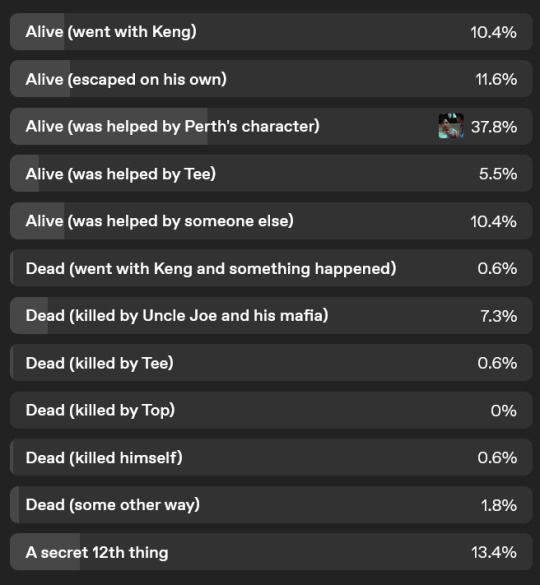
"Okay, Dante, but, even if that's true, where does White fit in all this?" Glad. You. Asked.
Now, if we're assuming Perth's character's the one that's gonna help Non (and possibly Keng or maybe not, idk and it really doesn't matter for now), we've gotta assume he's a possible suspect for the murderer. And even more so under this optic that Non is alive. Who more than a person whose whole reality seemed to be the mafia and who might've escaped it would be okay with murdering people? Right? Or, on the contrary, that he took a liking to Non and is trying to prevent him from further digging himself a hole in life and is trying to save him from himself.
You see, I didn't watch The Hidden Character (and those who did apparently recommend it stays that way). I didn't know any of these people before except those who were in Kinnporsche. And you know what that led me to? Curiously enough, dear reader: confusing Fuaiz with Perth. So, yeah, you know where this is going... White and Perth's character might be related. Brothers, probably.
"All because you think they look alike?" Well, if you ignore the way I just explained how it would tie some very loose ends... Yeah, kinda. BUT, in my defence, it makes a lot of genetic sense.
See, no other characters in the show really look this much alike. Believe me, I tested it.
For this purpose, I tried many different sites but the one that seemed to give me the most reliable results was FaceShape. Most characters got no more than 10%, some even got 0% (e.g. New and Perth's Character). And you wanna know how much White and Perth's character got? Nearly 50%.

For comparison reasons, New and Non who are CANONICALLY brothers, got about 30%.

BUT, if this is not convincing enough, my sister and I (who share EXACTLY the same 2 parents) got lower than them.

(pls ignore the picture, I was trynna make it as accurate as possible so I took a front pic with a neutral expression. also, my sister is censored for privacy reasons)

Now... Will I claim this is irrefutable proof? No. Not at all, but think about it: if White and Perth are related that might maybe explain how Tee and White met. It might also explain that really weird scene in the pre-release trailer (albeit all scenes in that are rather odd) where White-
Yes, thank you, Obi-Wan. And Anakin Tee is looking up at him, as if White has more power than Tee does. Because then, it could probably mean that White knows something and is probably there to do something. What exactly? Idk, man. He could be there to ensure the group remains clueless/confused or that they remain where they need to be for things to work... Or he could be there to try and prevent stuff from happening much to the likeness of what I stated for Perth's character's case.
"Oh, but if he knows something, wouldn't he know what happened to Non? Why would he be curious to watch the recording??"
Well, not necessarily. We know Non is not communicative and that he doesn't typically share his problems with anyone (the exception being Keng, obviously, but then again, the exception confirms the rule). And sure, Keng might be more talkative but idk if he would say something if Non asked him not to. I have a feeling he probably wouldn't (since he has that weird thing JJ mentioned about how he "loves Non" and, therefore, even if he's an abuser, he doesn't perceive himself that way and wouldn't do something he actively thinks would hurt Non). So, while Perth's character would know what happened to Non while he was being held by Tee's uncle and even some things about why he is there, he probably wouldn't know the rest.
But then why would he date Tee? Well, this is a narrative so... Foils are something that can happen. Having White and his relationship with Tee be a parallel to that of Phee and Jin is not weird and, in fact, has happened in the very first episode when both couples arrive at the room where the singles are, in pairs. Therefore, it wouldn't be weird to think of White as someone who maybe also fell in love with the guy that was supposed to be a means to an end or, alternatively, and perhaps more interestingly, have White NOT be in love with him and actually succeed, unlike Phee. Thus, drawing the comparison that, while Tee and White are in a relationship, White didn't fall in love and, inversely, while Phee and Jin aren't in a relationship, Phee did fall in love.
And this would mean that all we've seen of White's fear might, in fact, be an act to throw suspicion off of him. Or even more justified because he knows exactly what's lurking in the woods... After all, why would he suddenly join Jin's goodbye party if he's not a friend of Jin's? What reason better than to tag along your boyfriend's getaway with his friends if not to protect him from the terrible consequences of his actions?
But I get it. It's an extremely convoluted theory and, in all honesty, maybe makes the show more dull and boring if it's true because... Why would they repeat this "secret brother" twist? Or the dating with second intentions trope? It could be a narrative parallel, yes, but I can also definitely see how people could point that out as uncreative or lazy writing.
Either way: these thoughts were circling around my head and, before the next episode confirms or destroys them, I wanted to get them out into the world for y'all to, maybe, hopefully, join in on the hype for it, as it's less than 24h 'till it airs. Hope in that I was successful, at the very least.
Anyway... As usual feel free to (politely) argue with me, tell me I'm wrong, tell me I missed this and that, add to it, etc... Because if there's one thing I currently love more than DFF itself, it's definitely the fandom and I want us to make the most of it!!
I'll see y'all tomorrow when we're freaking out about episode 10!!!
All the love! 💜💜💜
#dff#dff the series#dead friend forever#dead friend forever the series#dff theory#dff the series theory#dead friend forever theory#dead friend forever the series theory#dff meta#dead friend forever meta#dead friend forever the series meta#dff the series meta#white dff#white dff the series#white dead friend forever#white dead friend forever the series#dff white#dff the series white#dead friend forever white#dead friend forever the series white#dff spoilers#dead friend forever spoilers#dff the series spoilers#dead friend forever the series spoilers
114 notes
·
View notes
Text
Take a concrete example. Can a Great-Russian Marxist accept the slogan of national, Great-Russian, culture? No, he cannot. Anyone who does that should stand in the ranks of the nationalists, not of the Marxists. Our task is to fight the dominant, Black-Hundred and bourgeois national culture of the Great Russians, and to develop, exclusively in the internationalist spirit and in the closest alliance with the workers of other countries, the rudiments also existing in the history of our democratic and working-class movement. Fight your own Great-Russian landlords and bourgeoisie, fight their ‘culture’ in the name of internationalism, and, in so fighting, ‘adapt’ yourself to the special features of the Purishkeviches and Struves – that is your task, not preaching or tolerating the Slogan of national culture.
The same applies to the most oppressed and persecuted nation – the Jews. Jewish national culture is the slogan of the rabbis and the bourgeoisie, the slogan of our enemies. But there are other elements in Jewish culture and in Jewish history as a whole. Of the ten and a half million Jews in the world, somewhat over a half live in Galicia and Russia, backward and semi-barbarous countries, where the Jews are forcibly kept in the status of a caste. The other half lives in the civilised world, and there the Jews do not live as a segregated caste. There the great world-progressive features of Jewish culture stand clearly revealed: its internationalism, its identification with the advanced movements of the epoch (the percentage of Jews in the democratic and proletarian movements is everywhere higher than the percentage of Jews among the population).
Whoever, directly or indirectly, puts forward the slogan of Jewish ‘national culture’ is (whatever his good intentions may be) an enemy of the proletariat, a supporter of all that is outmoded and connected with caste among the Jewish people; he is an accomplice of the rabbis and the bourgeoisie. On the other hand, those Jewish Marxists who mingle with the Russian, Lithuanian, Ukrainian and other workers in international Marxist organisations, and make their contribution (both in Russian and in Yiddish) towards creating the international culture of the working-class movement – those Jews, despite the separatism of the Bund, uphold the best traditions of Jewry by fighting the slogan of ‘national culture’.
Bourgeois nationalism and proletarian internationalism – these are the two irreconcilably hostile slogans that correspond to the two great class camps throughout the capitalist world, and express the two policies (nay, the two world outlooks) in the national question. In advocating the slogan of national culture and building up on it an entire plan and practical programme of what they call ‘cultural-national autonomy’, the Bundists are in effect instruments of bourgeois nationalism among the workers.
Lenin, V. I., Critical Remarks on the National Question (1913)
93 notes
·
View notes
Text
Notes on Roman demography:
It's really, really hard to estimate how many people lived in Rome or in Italy as a whole. In republican times, the census only counted free adult men.
Augustus' census recorded 4 million people in Italy, but we don't know how to interpret this number. If it's like earlier censuses (male citizens only), it implies a total population of around 10 million, and a big surge in the last 200 years.
But our literary sources almost all imply the population was stagnating or declining due to the wars and famines of the 1st century BCE, and Augustus himself thought the population was declining.
So, most historians now think the 4 million number does include all Roman citizens in Italy, male and female. If so, this is indeed a decrease from the 4.5 million we've estimated for 225 BCE, based on Polybius' account of the Second Punic War.
Losing over 11% of the population, even after adding new citizens through manumission, immigration and colony-founding, would have had massive effects on politics. (It's the equivalent of the USA losing 37 million people.) This may have made the surviving Romans more willing to accept Augustus' autocratic rule, which at least promised stability. It might have offered career opportunities to new men like Cicero and Marcus Agrippa as the ranks of the nobility were thinned. And I strongly suspect it contributed to Augustus' notorious marriage laws, which unsuccessfully tried to incentivize having more kids.
I also wonder if high mortality rates are part of the reason Rome was so open to integrating foreigners as citizens. Rome was at war nearly every year, and in the Second Punic War (for instance) lost over 25% of its adult male population in battles. (1)
However! Rome's slow recovery during and after the Augustan age, plus greater economic mobility, helped the population bounce back, reaching a high around 120 CE of 1 million in Rome and ~75 million for the empire as a whole. (2)
(The population and economy got so big we can see traces of it in polar ice cores - they raised Earth's carbon dioxide levels!) (3)
Life expectancy at birth was probably around 25-35. Half of all children probably died before the age of 10, but if you lived past that, it wasn't unusual to reach your 50s or 60s.
Slaves made up somewhere between 20-33% of the population of the late republic. (4)
Freedmen made up another big chunk. The highest estimate I've seen was 50% in Rome itself; lowest is around 20-25%. But in any case, there were a lot. (4)
Due to such high child mortality, and adult mortality due to war and disease, the average Roman woman gave birth around nine times. This partly accounts for why Roman girls were married off in their teens. The age gap between first-time brides and their husbands, and the number of pregnancies and children, were major systemic factors that kept Roman women subjugated under patriarchy. (5)
Adrian Goldsworthy, Antony and Cleopatra
Walter Scheidel, "Demography," The Cambridge Economic History of the Greco-Roman World.
Mary Beard, Meet the Romans (documentary series)
Erich Gruen, The Last Generation of the Roman Republic
Mary Beard, SPQR
The rest comes from Neville Morley's "Social Structure and Demography," in A Companion to the Roman Republic, ed. Nathan Rosenstein and Robert Morstein-Marx.
#my epubs make it hard to cite page numbers but poke me if you need a quote to ctrl+F#roman demography#neville morley#social structure and demography#a companion to the roman republic#jlrrt reads
95 notes
·
View notes
Text
Forgive me for showing my fangs a little here instead of being as delicate in phrasing as I usually am, but. Periodic reminder:
sweeping "humans suck, humans are evil, the world would be better off if humans disappeared/had never evolved" statements may be cathartic but they're thoroughly inaccurate (ie, the vast majority of uniquely bad effects of humans on the planet are a) extremely recent, like within the last couple centuries, b) the fault of an extremely small minority not the entire fucking species, and c) fixable)
hating being human isn't the same as hating humans. I get species dysphoria is a thing. I get that it's often hard to fit in as a nonhuman in human social groups and that can make it easy to slip into hating everyone around you. Please fight that instinct
villainizing people for traits they didn't choose, such as the species they were born into, is neither cute nor fair. No species is inherently good or bad
misanthropy is cathartic in short term vents or whatever but genuinely embracing it wholesale as a philosophy is liable to lead to you hating humans, human society, and being in a human body more and more over time and thus make your life worse by constantly reinforcing a thought pattern that makes you angry and upset
you are not immune to being part of human society (translation: just because you're nonhuman doesn't mean you're not included in statements about the effects of the human population on the world, ie "humans are killing the planet")
related, you are not better than humans for being nonhuman. looking at my fellow dragons in particular on this one. I get it, draconic pride is a thing, dragon brain probably says you're the supreme being and all else is beneath you especially anyone who annoys you. Mine does too. Please recognize that is an instinct you are supposed to FIGHT, not something that's TRUE AND THAT YOU SHOULD EMBRACE. Good fucking gods.
some nonhumans are also human (it's me, I'm some nonhumans) and you are making sweeping "humans suck, why would I ever want to be human, all humans do is kill the planet" statements in the presence of people included in those statements, which is insanely rude (and no, you don't get to "but you're different because you're nonhuman" me! you do not get to decide to ignore half of who I am because you don't like it, you do not get to decide I'm not "really" human, and also see the previous bullet point). this goes doubly if you're in a space like a DIscord server where people have expressly stated they're not comfortable being tacitly included in statements like that
saying "but I don't REALLY mean all humans, I just mean the specific ones at fault!" after the fact does not actually change anything if every other thing you say is constantly "humans humans humans" and not the group you're actually referring to, or at the very least doesn't change how it reads to everyone around you
#otherkin#misanthropy#rani talks#rani is biting today sorry#if you want me to dial it back and explain any of this in a calmer tone please ask i will be happy to do so#i'm just. aaaaaaaaaaaaaaaaaaaaaaaaaaaaaaaaaaaaaaaa#sick and fucking tired of seeing 'humans bad' in the otherkin community on a regular basis. ITS ME. IM HUMANS. STOP IT#it's not a constructive mindset!! it's not!! there's no constructive conclusion that can come out of misanthropy as a core philosophy!#all it can lead to is either 'nothing is fixable' which is a recipe for depression#or 'humans should be exterminated' which is GENOCIDAL#and it's fucking ALWAYS accompanied by 'but i'm better because i'm [x] instead har har har' No The Fuck You Are Not#you participate in society exactly the same way a human would#you are exactly as responsible for the effects of humanity on the world as anyone else around you#which is to say not very fucking much!#anyway /tag rant i'm hitting post before i think better of this one
368 notes
·
View notes
Note
I had always wondered why Binns wasn't replaced or the material updated for the History of Magic classes.
However I recently realised that History is a crucial part of understanding the world's past and paving the way for future. Not to mention History is tied with Civics/ Politics and plays a role in gaining your footing in the world and navigating creature relations.
To take such a crucial element away from the students and tell them to flounder on their own (especially muggle borns and raised who don't have the resources that pureblood and even half blood children do)
Coupled with the fact that whenever Harry learns a piece of history it's always from a biased source and by word of mouth (I mean text books can also be biased but still)
What I want to say is that generations of kids were seriously screwed over by the decision to not hire another effective History teacher.
Yes!! Yes!! All of this!!!
History is such an important thing to teach (I actually think real schools, at least where I live don't do a great job at it). As you mentioned, History is crucial to understanding politics, language, economy, and so much more. In the Harry Potter world, each spell comes with its own history of how it came into being and why, which affects how the spell is cast and what its effects are.
Now, Binns was the Hogwarts history Professor for a good century at least (he taught history in 1890 in Hogwarts Legacy as a ghost already), so it's not just Dumbledore who willfully keeps generations of Hogwarts students ignorant. And I think, if we opened their school books, we'd find a very biased account of Wizarding History and the goblin rebellions.
Now, I have a bit of a conspiracy theory about this and why history and magical theory aren't properly thought. Because their school books don't really cover why spells work or why potions need one ingredient over another, which in a world of magic feels like the bare minimum. I think the education problems, both with magical theory and with history are for the same reason — control.
As you mentioned, history is crucial to finding your footing in a culture, to understanding the world around you. Someone who is ignorant of history is easier to manipulate. They would be more prone to believing biased accounts and propaganda. And it's chilling how easy it was for the ministry to paint Harry as a deranged liar in book 5 by printing it in the Prophet. Even students who spoke with Harry and knew him personally believed it.
In book 7, a good portion of their world just kept living their lives, like there wasn't a war, like the minister wasn't under the Imperius. Some of the pure-bloods and half-bloods that have nothing to fear and aren't involved with the Death Eaters or the Order, they're just, there, living like nothing's wrong. They go to school, they go to work. Because if the newspaper (that's controlled by the ministry) says everything's fine, it must be true? Right? *sarcasm*
These are all signs of a very media-illiterate community that doesn't know how to be skeptical of what they read. And learning history, learning to ask questions about history, play a big part in teaching people how to be skeptical. I mean, learning about the history of propaganda and fascist regimes helps you know what to look for and how to hopefully not fall for the same tricks.
But the Wizarding World isn't interested in that. They're interested in a calm and controllable population.
Magical theory is the same in some ways. I wrote about how magic is all about intention here and here a bit. If you are focused and have enough magic and the force of will to back it up you can do anything. You don't actually need a wand or spells to cast magic, just a strong enough wish. This is how accidental magic works. Bright wizards like Tom and even Harry can learn to control their accidental magic, proving magic doesn't need wand waving and incantations. Yes, they make casting easier but they're not necessary.
But do you know what wands are necessary for? Following and identifying wizards. Wands are used to identify wizards and forbidding the use of them by creatures adds to the treatment of creatures as second-rate citizens.
And incantations? Well, if anyone could just cast whatever without a spell, magic would be incredibly hard (I might even say impossible) to regulate. You can't define which spells are unforgivable if spells don't exist. You can't make a list of illegal dark incantations if there are no incantations.
TL;DR
The Wizarding World of Harry Potter is kind of a dystopia.
#harry potter#hp#hp meta#hollowedheadcanon#hp headcanon#ministry of magic#wizarding world#harry potter meta#hollowedtheory
64 notes
·
View notes
Text
It’s almost that magical time of year that the Humane Society of America likens to a “natural disaster.” Kitten season.
“The level of emotions for months on end is so draining,” said Ann Dunn, director of Oakland Animal Services, a city-run shelter in the San Francisco Bay Area. “And every year we just know it’s going to get harder.”
Across the United States, summer is the height of “kitten season,” typically defined as the warm-weather months between spring and fall during which a cat becomes most fertile. For over a decade, animal shelters across the country have noted kitten season starting earlier and lasting longer. Some experts say the effects of climate change, such as milder winters and an earlier start to spring, may be to blame for the uptick in feline birth rates.
This past February, Dunn’s shelter held a clinic for spaying and neutering outdoor cats. Although kitten season in Northern California doesn’t typically kick off until May, organizers found that over half of the female cats were already pregnant. “It’s terrifying,” Dunn said. “It just keeps getting earlier and going later.”
Cats reproduce when females begin estrus, more commonly known as “going into heat,” during which hormones and behavior changes signal she’s ready to mate. Cats can go into heat several times a year, with each cycle lasting up to two weeks. But births typically go up between the months of April and October. While it’s well established that lengthening daylight triggers a cat’s estrus, the effect of rising temperatures on kitten season isn’t yet understood.
One theory is that milder winters may mean cats have the resources to begin mating sooner. “No animal is going to breed unless they can survive,” said Christopher Lepczyk, an ecologist at Auburn University and prominent researcher of free-ranging cats. Outdoor cats’ food supply may also be increasing, as some prey, such as small rodents, may have population booms in warmer weather themselves. Kittens may also be more likely to survive as winters become less harsh. “I would argue that temperature really matters,” he said.
Others, like Peter J. Wolf, a senior strategist at the Best Friends Animal Society, think the increase comes down to visibility rather than anything biological. As the weather warms, Wolf says, people may be getting out more and noticing kittens earlier in the year than before. Then they bring them into shelters, resulting in rescue groups feeling like kitten season is starting earlier.
Regardless of the exact mechanism, having a large number of feral cats around means trouble for more than just animal shelters. Cats are apex predators that can wreak havoc on local biodiversity. Research shows that outdoor cats on islands have already caused or contributed to the extinction of an estimated 33 species. Wild cats pose an outsized threat to birds, which make up half their diet. In Hawaii, known as a bird extinction capital of the world, cats are the most devastating predators of wildlife. “We know that cats are an invasive, environmental threat,” said Lepczyk, who has published papers proposing management policies for outdoor cats.
Scientists, conservationists, and cat advocates all agree that unchecked outdoor cat populations are a problem, but they remain deeply divided on solutions. While some conservationists propose the targeted killing of cats, known as culling, cat populations have been observed to bounce back quickly, and a single female cat and her offspring can produce at least 100 descendants, if not thousands, in just seven years.
Although sterilization protocols such as “trap, neuter, and release” are favored by many cat rescue organizations, Lepczyk said it’s almost impossible to do it effectively, in part because of how freely the animals roam and how quickly they procreate. Without homes or sanctuaries after sterilization, returning cats outside means they may have a low quality of life, spread disease, and continue to harm wildlife. “No matter what technique you use, if you don’t stop the flow of new cats into the landscape, it’s not gonna matter,” said Lepczyk.
Rescue shelters, already under strain from resource and veterinary shortages, are scrambling to confront their new reality. While some release materials to help the community identify when outdoor kittens need intervention, others focus on recruiting for foster volunteer programs, which become essential caring for kittens who need around-the-clock care.
“As the population continues to explode, how do we address all these little lives that need our help?” Dunn said. “We’re giving this everything we have.”
73 notes
·
View notes
Text
Fellah Cultivation Methods and Crops (1840-1914)
At the end of Ottoman rule, 75% of land was devoted to growing grains. A two-field system was common, with wheat and barley grown as winter crops on one half while the other half had a summer dew crop of sesame and Indian millet. The following season, the second half had the winter crop with the first half left fallow (Atran, 1986: 277). Other crops grown included dura, beans, fenugreek, and chickpeas, along with olives, grapes, cotton and oranges. Fallowing was widely used, allowing grazing cattle to feed on the fallow lands. The extensive system was not geared towards profit making but subsistence. The Ottoman government tried to outlaw fallowing by repossessing untilled land, but was largely unsuccessful (Atran, 1986: 278). Terracing was practiced in the hills with olive trees grown everywhere used as a source of oil and soap. By 1910 citrus groves covered 3,000 hectares. Vegetables were grown where irrigation was possible. The fellah [peasants] used homemade implements – a light nail plow, a sickle, a threshing board and two sieves [...].
Beginning with the 1858 Land Code, the Ottoman government, in an attempt to extract more taxes from the Fellaheen, tried to institute policies to transform land ownership. The goal was effectively to undermine «the system of collective holding and to institute an individual land-holding system» (Atran, 1986: 274). The code stipulated that a village could not communally own land and that titles should be given to each individual. Moreover, non-cultivated (Musha’a [collectively held]) land could not be the property of the fellah and would belong to the state. The 1876 Land Law decreed that Mulk [Sultan-granted] land held by notables who were not providing to services to the Sultan would be seized and could be sold to Europeans. One of the most notable purchasers was Baron Rothschild, who spent an estimated 10 million pounds sterling on land purchases, the construction of settlements, the establishment of plantations and manufacturing plants producing silk, glass, wine and water. He guaranteed the Jewish settlers who came to work on these plantations a minimum income (Aharoni, 1991: 57). At the same time the World Zionist Organization (WZO) was founded in 1897 and created the Keren Kayemet fund (JNF) for land purchases two years later. With their help, Jewish-owned land increased from 25,000 dunums [square kilometers] in 1882 to 1.6 million dunums by 1941.
Throughout these changes, the situation of the peasantry grew progressively worse as the tax burden increased. Often the fellah was forced to borrow money to make ends meet and many ended up selling the titles to their land, which they continued to work on, but with reduced benefits. By the turn of the century, six families in Palestine (the effendi) owned 23% per cent of all cultivated land, while 16, 910 families owned only 6% (Awartani, 1993).
The British Mandate (1914-1948)
Following the First World War, Palestine was designated as a mandated territory to Britain to rule the country until it become ready for independence. Along with this was the provision, first enshrined in the Balfour Declaration of 1917, to secure a national home for the Jewish people in Palestine. When the British received the Mandate for Palestine, the land issue was highly contentious. This is because the Mandate included the incompatible goals of «encouraging close settlement by Jews on the land» while at the same time «ensuring that the rights and position of other sections of the population are not prejudiced».
The British put into place policies that permitted the transfer of the land to the European settlers. The first being the transfer law of 1921, which granted individual holders the right to become the private owners of their land. Another law, the rural property tax, stipulated that land not cultivated for three years could be seized by the state and «be made use of in a more efficient way» (Zu’bi, 1981: 99). [...][D]espite new policies which tightened laws regarding Jewish land acquisition after 1929, the period of the mandatory government saw widespread expansion of Jewish agricultural settlements in Palestine (Table 1). For example, from 1900 to 1927, the area owned by the Jewish sector expanded from 42,060 to 90,300 ha: an average increase of under 2,000 ha a year. While from 1932 to 1941, after the riots, the area expanded from 105,850 ha to 160,480 ha – an average annual increase of 6,000 ha.

The quality of the soils of the land purchased is debated among scholars. According to Alon Tal, an Israeli environmental historian: «Though the real estate that Arab landlords were willing to sell was largely malaria infested swamps and wastelands, new agricultural settlements soon began to dot the map of Palestine» (Tal, 2006: 4). On the other hand, «The main areas appropriated by European investors were those concentrated in the maritime plain, the most fertile area in Palestine, specializing in citrus production» (Atran, 1989: 739).
Zu’bi (1981: 99) also writes, «Under British Colonization, the land appropriated by European (Jewish) settlers was the most densely populated areas. In 1921, the transfer of 240,000 dunums in the Beisan (Galilee) area to the European sector resulted in the dispossession of 8,730 families living from this land. By 1929 it was reported, 29.4% of peasant families’ land [that is, the land of 29.4% of peasant families] was expropriated as a result of the Zionist settlement».
– 2009. Leah Temper, “Creating Facts on the Ground: Agriculture in Israel and Palestine (1882-2000),” Historia Agraria 48, pp. 75-110.
101 notes
·
View notes
Text
(yesterday i received an ask, which prompted me to write the following response. the asker has apologised for sending it and i took it down to prevent anyone from laying into them, but present is anonymously below because i like my response and want you to see it)
"Based on the fun new revelation that the world is ending before I graduate, is it even worth it to try prepping or should we all just get ready to jump into traffic come 2025?"
okay, there is, A LOT to unpack here. i'm gonna do my best to respond to this helpfully, the way i am facing it: confronting it, emotionally processing it, pragmatically preparing, and holding on to a sort of grim, dark hope.
we're talking about climate collapse and the latest IPCC report here right? first off, it's not a new revelation. maybe it is for you personally, but for humanity as a whole, we've known about the inevitable outcomes of emissions damaging the climate since like the 70's. i found out about it myself in primary school in the mid 90's, when it was still called the greenhouse effect, and i then spent 20 years on and off in various roles of support for climate activism, when i had the spoons. if you're young and just finding out about it now i know it's probably overwhelming, and especially sucks the later you've been born into this mess… but i'm pointing out that it's not new, to underline the point that it's also not sudden. yeah it's getting worse, but it's been getting worse for generations, and will keep getting worse for generations.
it's not a meteor, or a volcano. it's a creeping steady decline of habitability with sputters and bursts of natural disaster; there is no timeline or event or threshold at which the world ends here.
that 2025 "deadline" from this year's IPCC synthesis report, for instance; it's not a date that the world ends. honestly, in some ways, it's kinda meaningless. what it is, as i understand it, is that all the data says that if we want to limit global average temperature rises to 1.5C by end of century - which we do, because even 2C would be catastrophic - we need emissions to peak by 2025 and then rapidly decline. it's a vastly oversimplified agregate of incredibly complex data reduced down to the point of absurdity in a desperate attempt by scientists to get corporations to allow governments to take action to limit corporations. it's a deadline for government action to limit effects by 2100. the year will come, and pass, and the world will go on. probably with emissions still going up, probably with targets shifted again and 2C accepted as the next half hearted goal that will also be missed, but life will go on.
no end of the world. life will go on. into the 2030's, into the 2040's, into the 2100's, life will go on. it'll be hotter and colder, wetter and drier, more storms and bushfires, less food and fertile land, but life will go on. populations will starve, land will become uninhabitable, life will go on. when you hear about "the end of the world" from climate collapse, it's not a hard apocalypse that kills us all off or whatever. it's the slow creep of nature getting more harsh, and the way we do things much harder.
if you look at the serious reports from scientists and militaries, the language you see isn't "end of the world", it's "end of modern societies". that's what's really at risk: the fragile infrastructure that holds up the ruling classes of rich nations and has us all scurrying around to make it work. mass scale power grids, international supply chains and just in time logistics, silicon wafer production, year-round plastic wrapped preserved passionfruit chunks grown in thailand, packed in argentina, sold in france, profits to america, money stored on a computer in the cayman islands. i can't sugarcoat it and say that's all that's at stake; people are definitely going to starve and drown and die of exposure; but that already happens every day in most of the world, right now. there are a million rohingya at the border of bangladesh, locals fleeing khartoum as the west airlifts out is nationals, people whose civilisations were crushed under the boots of empires and land destroyed to create the farmland and factories that are killing the planet. life for them goes on.
i mean, i get it. seeing the impending collapse of your society, everything you've known for your whole life being willfully destroyed, it's fucking devastating. we want to keep sitting here on comfortable couches with our gold and cobalt plated supercomputers sharing cat gifs on the hellsite. we don't want to have our civilisation taken away from us and be forced into brutal struggle to survive. it's going to fucking suck, it will be awful, and it will be (and already is) most destructive to the people who are already the worst off, which just sucks even more… and maybe your life is already bad enough that you don't think you can handle it getting worse. i mean, i've been suicidal since i was 14 and i've been through trauma and medical torture you wouldn't believe since then. i get it. you're scared, terrified even. existentially threatened. you don't know what you can handle and maybe you donn't wanna find out.
but here's the thing: the ONLY sensible thing you can do, now and going forwards, is prepare for it.
you wanna kill yourself when it gets hard? let's say sure, i agree with that. what's the threshold then, what's the limit? when will you kill yourself? the power grid going down? sewerage backing up? supply chains failing and being unable to buy food? from the comfort of the developed world, those all feel like exit points i can imagine many people taking as their out… but how long does it have to last before you know it's carbon-monoxide-party time? a month of no power, no flush, no food? a week, a few months, or a year? because it won't start that way.
it's not a meteor or volcano, it's a slow slide. some powerlines sagged so there's rolling blackouts every now and then, a few hours or a day at a time. pipes backed up a bit so pressure is reduced for a week until repairs are done. fires and plague have closed roads so shelves are bare and stores are limiting purchases on essentials this month. there will be bumps along the road before there will be any sort of definitive cliff where you can say "this is it, now is the time to kill myself". these bumps are already happening.
i really hope you can agree, it'd be absurd to be such a fatalistic doomer that you kill yourself instantly at the first blackout, dry tap, or closed grocery store; when you can't know if it'll be back up in a few hours or tomorrow or next week. these small disruptions are already happening right now, directly as a result of climate collapse, but we're still here, still living. if we're going to talk about suicide as a pragmatic option, you need a threshold, and wherever you set it, you'll have to get through what comes before. "i'll kill myself after a month with no grid" still means you gotta be ready for a week without it. you gotta prepare, even if you plan to not survive.
and i know it's overwhelming, i know. to look around and think about what is essential to keep you going, what you can sacrifice, how you can make it through. but you're not going to be doing it alone, everyone around you is going to be doing it with you. we're all going to be struggling through it, and based on how communities have responded in the last few years to a string of once-in-a-lifetime disasters here in my home of climate-fucked australia, i am certain that when the climate collapses around a group of people, they will form a community and help each other, no matter how selfish and mean of a country bogan (translation: redneck) they are. people will help each other; people already are helping each other.
because yeah, climate collapse will probably destroy modern civilisation… but so what? it's a neoliberal capitalist hellscape quickly plunging us into technologically enforced eternal authoritarianism… and like, not to be an accelerationist or anything, but here's that dark hope i mentioned: i'm kinda relieved by the thought that the infrastructure that enables it won't last this century. that climate collapse will force us out of these horrors, and back into real, interdependent community.
so do what you can to prepare, how you can, to make the little disruptions more bearable and comfortable. there's plenty of resources still available for off grid life, camping, home agriculture, and general self sufficiency out there on the still-existant internet, and more people are getting into it all the time - not just what you imagine when you hear "prepper". any skill you can develop, anything you can do to prepare, even if it's as simple as keeping extra shelf stable food and a jug of clean water around, anything you can do will help you materially and more importantly, mentally.
having some jerry cans of water and a small solar setup has been amazing for my mental health and anxiety! and as much as i'm putting material and energy into preperations, i'm also putting them into comfort, maybe even hedonism. collecting some cool lego, got some fancy synths i didn't need, making fucked up noise music with them. enjoying the sound of the neighbours' chickens, looking forward to the day "the world ends" and i can free-range my own on the council's nature strip and share the eggs with the pottery lady down the street. once you're prepared to survive a week of grid down, maybe you'll realise a month, a year, isn't so unbearable. maybe it starts to feel nice?
because i've been there, the suicidal grief. 2018 was absolutely the worst year of my life and i was sure i'd die being tortured in hospital, and coming out of that, in 2019, both the IPCC and ADF released incredibly bleak reports on climate collapse outcomes, and it all sank in. all the spare spoons i'd sunk into helping when i could, all the decades of scientists desperately warning, it all failed. the final warnings have been coming for years, with no change in course, it's happening. and i faced the realisation that my decades were limited, my time of comfort short, and i started despairing and grieving. i turned to what support systems i had, and they failed me. when my psych asked what i was so anxious about and i started explaining the climate reports, he tensed up and started asking diagnostic questions for dilusional psychosis. i went home and cried, i was sleeping on the couch in the junk storage room of my sharehouse because i'd let my own room fill up with so much trash that there was a distinctly organic smell of growth choking the whole place out. i was fucking done, my heart and body broken, there didn't seem to be any point in anything, not without a future. it's the closest i've been to killing myself since leaving home…
so i said, fuck it. i've got a tiny pool of cash from welfare backpay, and i bought a synth i wanted. it fucking rocked, and brought me so much joy, so i bought another, and another. no future to save for, anyway. i made some cool music, i never saw that psych again, i gave up on my drive for revenge on doctors and finding answers about my fucked up nervous system, why bother when the world is ending? and i made music. i can kill myself later maybe. i started loving myself more, because what's the point starving to death hating myself? i made music and got confident and cleaned my fucking room, bought a new mattress. i met a girl and took a chance and we fucked real good and i fell in love again. i moved out somewhere new and quieter and left a home of over a decade behind me, left parts of my identity behind me, moving forward and growing for the better. i have a family now, the first family that has ever loved me without expecting anything in return, and i love them with all my heart. i listen to the chickens, and watch leaves float down the storm water drain, and make cool music. yesterday i listened to a 14 minute track i made 6 months ago and almost cried, because nobody can make music that is so perfect for my tastes except me, and i brought it into existence. on the weekend i'm gonna set up the solar panel to keep the backup battery topped up, i use it to charge my phone and laptop, which the kids would call solarpunk and i'd call cool as fuck to have a solar powered laptop.
in 2019 i stared into the void and realised there is no real future for me, for human civilisation as we know it, and i grieved and processed… i almost killed myself, but i didn't, and the years since have been the best of my life, no question.
so, no. don't kill yourself, now or in 2025 or at any point until you can't handle the torture anymore. "graduation" sounds young, real young, even if it's tertiary. i'm creeping towards 40, and the age that "graduation" conjures makes me think that you've got a hell of a lot of potential left in you, for fun and stupidity, and growing up, and finding love and heartbreak, and your version of wierd-arse synth music.
so go out there, prepare, and enjoy.
…
…..and for the love of all the false goddesses of the void, never, NEVER EVER again contact a random fucking blog on tumblr and ask if you should kill yourself. holy fuck buddy. the amount of pressure you put me under to deliver an emmaculately worded response that somehow talks you down from the ledge without lying, is way, way too much fucking pressure. i really hope you were being stupidly hyperbolic, but even then, Eris Fucking Kallisti Herself In Absurdist Pagan Blasphemy, so incredibly unacceptable to say to a stranger. i think you need a therapist, even if they do think you're catastrophising, because like. shit dude. this is abso-fucking-lutely not okay!
now go. prepare and enjoy.
(reminder that asker apologised and i have no hard feelings for a midnight despair ask)
287 notes
·
View notes
Text
MXTX Interview with Risa Wataya for Subaru Magazine P.6
Creative Process:
Risa: "Mo Dao Zu Shi" has not only sweet scenes but also painful scenes. After scenes of brutality, violence, and death, the characters might carefreely chat about nothing and everything, or there might be some lovey-dovey scenes. This is like treating readers with alternating pleasure and torture. Did you do this intentionally during your creative process?
Moxiang: If I only write about sad, painful story elements, my readers will inevitably leg it. From the other perspective, joy and happiness are comparatively fleeting emotions. If I only write joyful, happy stuff, I would not be able to touch and move my readers to any significant depth. Therefore, I paid special attention to balancing both sides during my creative process.
Kuohao: If you keep the same kind of tone throughout the story, the evocative effect will inevitably decrease. Readers will eventually become bored of it. But if you time it right, readers (listeners in the case of audio drama)'s emotions will go up and down along with the flow of the story. The pacing and structure of "Mo Dao Zu Shi" are incredibly well-timed. As a result, the audio drama script was not changed in any significant way and stayed loyal to the source materials' strength.
Risa: Do you feel pain when you write sad parts, and joy when you write happy parts?
Moxiang: In the case of "Mo Dao Zu Shi", I put myself in the position of an observer when writing sad parts, and focus on the development of the narrative. In the happy parts, I put myself among the characters and indulge in their shared joy.
Risa: That's so clever of you. There are so many 'torturous' (*) parts in the novel, so I thought perhaps it was very difficult. When reading "Mo Dao Zu Shi," I feel that there's a vast world populated by many people in Ms. Moxiang's mind. Where does Ms. Moxiang's immense imagination come from?
(*: literally 'reverse/mistreat/torture.' It's a modern Chinese slang denoting sad story elements designed to 'emotionally damage' the readers. Please check the note for the same word in part 3 of this translation)
Moxiang: If we are speaking of imagination, I feel that it's important to visit many places and meet vastly different people. In other words, step out of the house a bit more. But in terms of building characters, observing people is of great importance, even more important is... to dig deep into your own heart.
Before, when I was a young child, I read stories by Alexandre Dumas, Hugo, Balzac, and other world-famous authors. A writer staying in his room alone, talking to himself, laughing, and crying. A friend visiting him saw him in this state and became worried: "Is your mind alright?" But when the friend was about to leave, the author said: "Don't worry about me. I'm just writing a story."
Risa: The excitement of unraveling mysteries starting from the introduction of the story is a pleasure when reading Ms. Moxiang's novel. The introduction carries details that, sometimes later on, become a key point in the second half of the story in unimaginable ways. There's also a feeling of picking up hints and information purposefully left behind by the author. Is this a careful deliberation on your part during the writing process?
Moxiang: As I said, I only start to truly write once I have completed the outline of the story. About 80% of the story is planned. 20% is inspiration that came up during the writing. I think that the story structure is immensely important.
..
Translator’s Note: In this part is a section concerning the audio drama by Mimi. Risa talked mostly to Kuohao. Moxiang only chimed in at the last bit to say the production quality was very high and she was very happy with it. So, for now, I’m not including that part here. Once I have completed the translation, I will reorganize everything into a single file, proofread, edit, and host it on google drive so that it can be shared with the community.
..
Before writing "Mo Dao Zu Shi"
Risa: Ms. Moxiang, please tell us how you started writing stories. What kind of stories did you write when you first started?
Moxiang: The first time I started writing stories was probably while I was in elementary school. Along the way to my school was a bookstore selling books as big as a hand. I love buying the ghost story magazines there. Because of this influence, I remember writing lots of horror stories while in elementary school. Although most of them were just short parts and scenes and weren't complete stories. The first story I completed was 'Tian Shi' (lit. Celestial Master), a schoolyard romance story, during my secondary school. Even though it was just a WIP draft, it still got some of my classmates really riled up. "I also want to be a character in this story." "I want to be in the same team as this heroine." I got a lot of requests like this.
Risa: Woa, I so want to read that story!
Moxiang: the heroine, the heroine's childhood male friend (let's call him A), and a male classmate that suddenly appears (let's call him B). This story is about these three. The thing I remember most about this story is: when I asked my classmates, who were my first readers, for their opinions (I still keep the draft now. Even though now it's old and yellow); around that time, I wrote a romance between the heroine and B, but the result from all of my readers was: everyone liked A instead! I was so shocked! Everyone commented: "B's love is so whatever! (*) We want to see A and heroine together!" (laugh). I could not understand it at the time, but now that I think about it, A certainly does have a charm of his own. Even though I wrote without any kind of plans or forethought at the time, after that, I started to realize: "The main character must be a person I love the most and has the most charm." At the time, I looked at my classmates' excitement and admiration for my story and felt so happy. As a result, my old notes are filled with old, incomplete stories. If I have a chance in the future, I would like to complete them.
(*: Northeastern Mandarin slang 爱咋样咋样. A combination of Heibei-Shandong and Jiao-Liao Mandarin. It means 'whatever' / 'don't care'/ 'indifferent')
Risa: To be honest, I have the same experience as Ms. Moxiang. I drew manga while in secondary school. My classmate said after reading: "I hope you can continue to draw." I was overjoyed. Perhaps it is because of this kind of experience that I became a novelist.
Moxiang: Me too. From the start, I also wanted to become a Manhua artist! Perhaps this is normal for people who want to become novelists. Because I never had the chance to learn how to draw, the result is that I chose to become a novelist.
Risa: A, I feel the same! Ms. Moxiang, where do you get your ideas?
Moxiang: To put it simply, it starts from 'fulfilling a personal desire.' For example, if it's a detective or mystery story, then I want to fulfill my curiosity and solve puzzles. If it's a romance story, then I want to love and be loved. If it's a survival story, then I want to see survival in extreme conditions. To fulfill these desires, I think of how to best tell stories. To write a great story, one must have a foundation of intense desire. Of course, the amalgamation of multiple desires also works. In fact, 'desire' is a 'thread.' The story is the pursuit of this 'thread' to the very end. Once you have found a strong desire, disregard everything else, the story starts there.
Risa: So that's how it is.
Moxiang: I think that each author has different ideas. I personally build the characters first. Their personality, their destiny, and their emotions. Once a character with irresistible charisma appears and makes people fall in love with him (her), then they will surely love his (her) story too. Therefore, build the characters first, then weave the story. That is my process. Until now, I've only produced three novels. So I still find the process of structuring a story to be complicated. In terms of the structure and pacing of stories, I strongly recommend Robert McKee's "Story"! You can learn the theory of writing craft.
To Be Continued
Translator: Sythe / NPD Khanh
210 notes
·
View notes
Note
Random question, are there powers that in universe just don't exist or is anything a possibility?
Cause I'm curious if someone could have a Null power, where they're basically a blank and cancel out all other powers. I always found it to be a neat one.
It is a neat and awesome power! It’s not flashy like the others, but in a city where almost half of the population has some kind of powers or abilities, no matter how minor, it can become an OP and oppressing power fast.
As for whether it exists in the world of Vendetta, right now, there hasn’t been anyone found with that kind of power. But it is not impossible and because powers keep evolving and changing as times pass, it is possible one day, there’ll be someone who’s just lucky enough to be born with it! Even then, it will be rare though, and even if they have children, there’s no guarantee they will inherit the same power.
Also, fun fact, Viktor’s power’s side effect causes the nullification of the power that he’s copying for a short period of time. I think I wrote more explanation on it in the stat screen menu, Character Guide.
For example, if he touched someone with pyrokinesis, that person would not be able to use said power for like a few minutes or so, but Viktor also wouldn’t be able to use the power he just copied in that same span of time as his body needs time to adjust to the power.
It is actually the main primary way Viktor defeated his opponents. Rather than engaging in a risky mirror fight where the original user might have the advantage of being more familiar with the power they are born with, he uses his own power to act as a short term nullification.
That was usually enough to catch his opponents off guard and keep them distracted or worse, panicking, and that, paired with his deadly combat training, gave him the upper hand and most often than not, he would win the fight.
#asks#anon ask#lore#char: viktor#if: vendetta#vendetta if#if vendetta#abilities#power/abilities#if game#if wip#dashingdon#choicescript
84 notes
·
View notes